Reviews
Billy Wilder
USA, 1948
Credits
Review by Glenn Heath Jr.
Posted on 09 March 2011
Source Bootleg
Categories Brackett & Wilder
The title of Billy Wilder and Charles Brackett’s wacky propaganda film A Foreign Affair has a potent double meaning. It literally refers to Captain John Pringle’s seedy tryst with German singer and ex-Nazi sympathizer Erika von Schluetow in post WWII Berlin, but ideologically it points to a developing homegrown frustration with American military forces spending large amounts of time, money, and emotional involvement overseas. The film’s opening moments are spent personifying this theme of national malaise/wastefulness in the form of a small government sub committee sent by the United States Congress to study the morale of American troops overseeing the reconstruction of Germany, all in the hopes of analyzing the collective character of servicemen abroad. Made up almost entirely of opinionated white elder statesmen who fruitlessly argue over the best way to help the German people, the single woman of the group, Congresswoman Phoebe Frost, sticks out like a sore thumb due to her arresting devotion to the mission at hand. As their airplane flies over bombed out Berlin, Phoebe shows an almost fundamental determination toward illuminating the shady practices of American soldiers using goods and services in exchange for sex and liquor, calling the epidemic of vice “moral malaria” that must be quelled. In terms of ideological cunning and conviction, she’s G.I. Jane.
If Phoebe’s ice-cold focus represents the ultra-conservative element bellowing across the Atlantic from afar, John’s casual manipulation of military protocol and power embodies a hilarious deconstruction of a flailing American foreign policy mired in a collective need for physical ecstasy. John’s lust for exotic women seems to inhabit every soldier in the film, with whole sequences devoted to the bustling black market, dimly lit bars, and German/American couplings locked in close embrace. There’s a telling duality between the self-satisfaction of the Americans and the self-preservation of the Germans, a motif that only becomes more complicated when Phoebe enlists the freewheeling John (whom she believes to morally upright) to help her investigate the officer holding up Erika’s bureaucratic safety net. John tries to cover up his own guilt by seducing Phoebe, and this switcheroo becomes the driving comedic structure for A Foreign Affair, separating him from his sexy fraulein to create an odd couple pairing with the sexless American ice queen. But Wilder and Bracket use John’s own quest self-preservation as a romantic wake-up call for the American, wiping away the fog of German lust for a more substantial and constructive relationship with a smart and loving woman from Iowa.
If A Foreign Affair lacks the punch of Wilder’s later dramatic forays into social commentary, like the devastating corporate compromise in The Apartment and legal malfeasance in Witness For the Prosecution, it still harbors a great deal of angst toward the failure of military institutions. John’s charming indiscretions are the source of all the comedy and romance in A Foreign Affair, but his weaknesses, both past and present, are given real weight and consequences. Throughout the film, higher ranking officers comment on John’s stellar war record, rationalizing his current sleazy actions because of the difficulties facing these soldiers after coming come down from the high of combat. But John’s consistent arrogance toward subverting the chain of command makes this undercurrent secondary to the more salacious acts he’s willing to commit to save his own skin. The smoky bar where Erika sings songs about the contradictions of post-war life perfectly inhabits this unsavory individualism and extended mental detachment after experiencing the traumas of WWII. In a ditty about the Berlin black market, Erika sings, “I sell my goods behind the screen,” implying there’s a facade of American law enforcement and control that she is willing and able to circumvent. In fact, John is so seduced by Erika’s sexual prowess he doesn’t even know how deep she was once embedded in the Nazi party, a key plot point that only reinforces the nationally symbolic love triangle at the heart of Wilder and Bracket’s narrative. In his quest to blind Phoebe with love, John becomes exactly like Erika: A traitorous wolf willing to play the sheep in order to stay relevant and powerful.
But A Foreign Affair is ultimately a romantic comedy and not a tragedy, so it’s commentary remains suitably light-hearted. Despite their glaring differences, Phoebe and John end up sharing a particularly American fantasy about true love that leaves the embittered Erika out in the cold. Theirs is a romance born out of an organic dedication to national creed, something Nazi’s like Erika can never understand. A sub-plot concerning Erika’s vengeful Gestapo ex-boyfriend only solidifies John’s separation from the striking German seductress through narrative contrivance. This finalizes John’s own death knell toward philandering and pushes him closer to nationalistic/romantic commitment, a plot twist that feels tacked on merely to connect the two American lovebirds and divide them from the pragmatic German siren grasping at straws to stay afloat. Wilder and Brackett see no future for United States servicemen looking to escape reality in German brothels, bars, and alleyways, and A Foreign Affair ends with an exclamation point in favor of returning home.
In the film’s final sequence, the themes of nationalistic duty and pride come full circle. After John chooses Phoebe, Erika tries to seduce a Colonel in order to insure her safety, the older man insisting he’ll be of no help since he “just became a grandfather.” If it wasn’t clear already, having a wife, kids, and a white picket fence is the only true cure for American immorality abroad, and Wilder and Bracket practically force the once wayward John into submission. A daring shootout inside Erika’s dive bar (now fully illuminated) gives John one last taste of violence. As he walks around the Nazi casualty almost upset the action is over, Phoebe runs to his side and John instinctually pulls away, more afraid of long-term commitment than being killed in battle. A Foreign Affair cuts to black as Phoebe permanently corners John with cutesy talk about their wonderful future together, his once charming grin now turned to a wonderful sour face of uncertainty. It seems the love of a good woman (and country) is enough convince even the biggest moral infidel there’s no place like home, even if they have to be dragged into responsible adulthood kicking and screaming.
More Brackett & Wilder
-
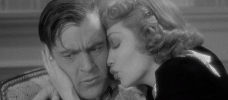
Bluebeard’s Eighth Wife
1938 -
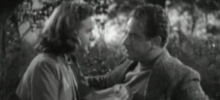
That Certain Age
1938 -

Midnight
1939 -
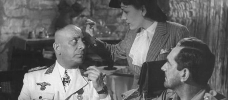
Five Graves to Cairo
1943 -

Ninotchka
1939 -
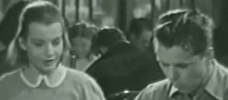
What a Life
1939 -
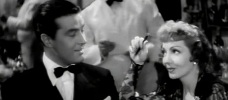
Arise My Love
1940 -
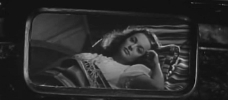
Hold Back the Dawn
1941 -
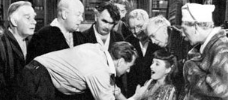
Ball of Fire
1941 -
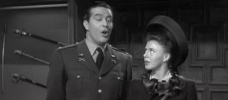
The Major and the Minor
1942 -
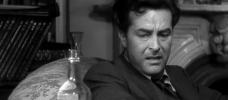
The Lost Weekend
1945 -
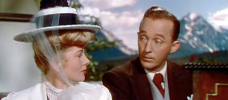
The Emperor Waltz
1948 -
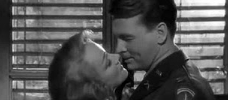
A Foreign Affair
1948 -
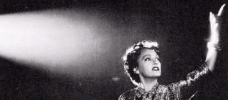
Sunset Boulevard
1950
We don’t do comments anymore, but you may contact us here or find us on Twitter or Facebook.



